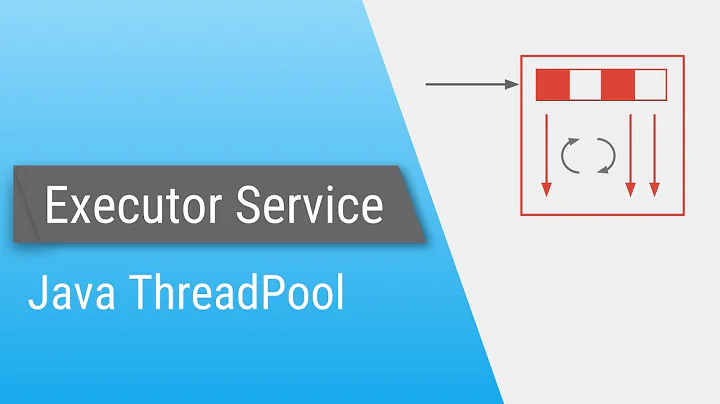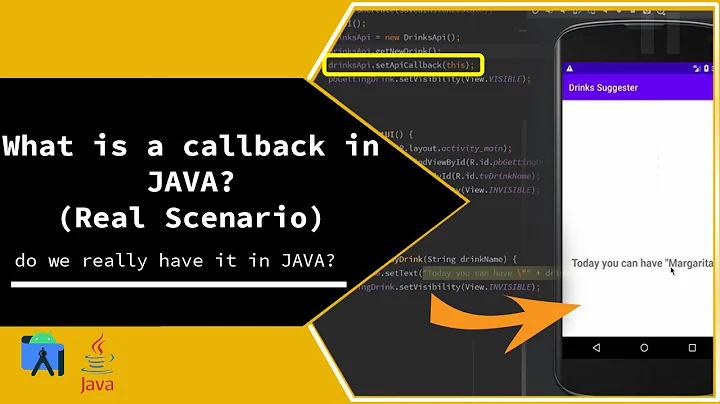Java set a callback from ExecutorService
Solution 1
If using Google Guava is an option, you could utilize the ListenableFuture interface in the following manner:
- Convert an
ExecutorServiceto a ListeningExecutorService viaMoreExecutors.listeningDecorator(existingExecutorService) - The
submit(Callable<V>)method ofListeningExecutorServicehas been narrowed to return aListenableFuture, which is a subinterface ofFuture. -
ListenableFuturehas anaddListener()method so you can register a callback to be run when the future is completed.
Solution 2
You can add a callback for when a thread returns in Java 8+ using CompletableFuture as in the following, where t is the result of your long-running computation,
CompletableFuture.supplyAsync(() -> {
T t = new T();
// do something
return t;
}).thenApply(t -> {
// process t
});
If you want to use callbacks in just Java 7, you could do something like,
int x = 10;
ExecutorService fixedThreadPool = Executors.newFixedThreadPool(x);
Future<T> result = fixedThreadPool.submit(() -> {
// do calculation
return T;
});
fixedThreadPool.submit(() -> {
long minutesToWait = 5;
T t = null;
try {
t = result.get(minutesToWait, TimeUnit.MINUTES);
} catch (InterruptedException | ExecutionException | TimeoutException e) {
LOGGER.error(e);
}
if (t != null) {
// process t
}
});
Solution 3
ExecutorService#submit return FutureTask<T> which helps you to retrieve result and the ExecutorService#get method will block execution until the computation is not completed. Example -
ExecutorService executor = Executors.newFixedThreadPool(10);
Future<Long> future = executor.submit(new Callable<Long>(){
@Override
public Long call() throws Exception {
long sum = 0;
for (long i = 0; i <= 10000000l; i++) {
sum += i;
}
return sum;
}
});
Long result = future.get();
System.out.println(result);
Solution 4
So, I was wondering if it's possible to attach a callback function to the event of a thread finishing using the ExecutorService.
Not directly, no, but there are a couple of ways you could accomplish this. The easiest way that comes to mind is to wrap your Runnable in another Runnable that does the reaping of the results.
So you'd do something like:
threadPool.submit(new ResultPrinter(myRunnable));
...
private static class ResultPrinter implements Runnable {
private final MyRunnable myRunnable;
public ResultPrinter(MyRunnable myRunnable) {
this.myRunnable = myRunnable;
}
public void run() {
myRunnable.run();
Results results = myRunnable.getResults();
// print results;
}
}
Related videos on Youtube
Alex
Updated on September 29, 2022Comments
-
Alex over 1 year
I have a fixedThreadPool that I am using to run a bunch of worker threads to achieve parallel execution of a task with many components.
When all threads have finished, I retrieve their results (which are quite large) using a method (getResult) and write them to a file.
Ultimately, to save memory and be able to see intermediate results, I'd like each thread to write its result to the file as soon as it finishes execution and then free its memory.
Ordinarily, I'd add code to that effect to the end of the run() method. However, certain other objects in this class also calls these threads, but DO NOT want them to write their results to file - instead they use their results to perform other calculations, which are eventually written to file.
So, I was wondering if it's possible to attach a callback function to the event of a thread finishing using the ExecutorService. That way, I can immediately retrieve its result and free the memory in that scenario, but not break the code when those threads are used in other scenarios.
Is such a thing possible?
-
JasonMing over 8 yearsThe
myRunnable.getReulststill will block the executing thread, it is not the pure asynchronous mode with "callback". -
Gray over 8 yearsI assumed that the
getResult()call didn't block and that therun()method stored all of the results in your object. Having aget...method block isn't the best pattern @JasonMing. -
Gray over 8 yearsHe specifically did not want to change the
run()method as stated in his question. -
 Max about 6 yearsThe reason you'd submit the task to a separate thread is so you can avoid blocking the current thread for a long computation, and you can use the current thread for other things. Since
Max about 6 yearsThe reason you'd submit the task to a separate thread is so you can avoid blocking the current thread for a long computation, and you can use the current thread for other things. Sincefuture.get()blocks, it should be called in a task which is also submitted to theExecutorServiceas well. -
xyman almost 5 yearsThink you've forgot to provide fixedThreadPool to
supplyAsync()method in first example.




